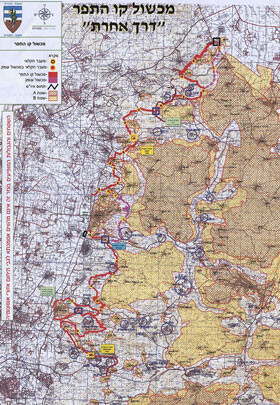One Land, Two Systems 25 May 2004

The Israeli military’s map of the seperation wall’s “first phase.” For a larger image, click here.
Just as the much-debated construction of the ‘wall’ between Israel and the Palestinian territories makes clear, the spatial planning policies in Israel lead to a state of ‘apartheid’, in which the Arab population is denied possibilities for development. Two systems, two existences, two physical realities. For Israeli villages, investment in their future encompasses good services, roads, green areas, while the ‘unrecognized’ Arab villages remain white spots in the eyes of the government, often literally removed from its maps. The architecture design competition is urgent because the results will be used in the case for the Israeli High Court against the Government Masterplan and the demolition of Arab houses.
The project One Land, Two Systems brings together architects, planners, photographers, lawyers, writers, human rights activists to design and show alternatives and to bring these into the publice debate. The FAST initiative (Foundation for Achieving a Seamless Territory) does not only aim at an
international audience, but tries to stimulate the public debate in Israel proper. With this design competition the international professional engages the spatial planning in Israel.
The program of 6 June in De Balie consists of a press conference and a public debate.
The press conference presents the architecture design competition, and the background of this competition through the description of the situation of Ein Hud, an ‘unrecognized’ village in Israel. The Q&A session will be followed by a debate on the significance of this project and the use of spatial planning for political purposes in Israel and elsewhere.
Participants include Malkit Shoshan (initiator FAST/ Foundation for Achieving a Seamless Territory), Anil Ramdas (de Balie), Muhammad Abu al-Hayje (Ein Hud-resident and chairman of the Association of Forty organisation of un-recognized villages) and international jury members Stefano Boeri (architect,
editor Domus magazine), Jeff Halper (Israeli Committee Against Housing Demolition), Alexandre (Sandy) Kedar (professor of Law, Haifa University), Eyal Weizman (Isreali architect, artist and writer, Londen), and others.
Ole Bouman chairs the debate
The event will be held in English.
For more information
Reservations: 020-5535151
Venue location: De Balie Amsterdam
Kleine-Gartmanplantsoen
10 1017 RR Amsterdam
www.seamless-israel.org
http://www.debalie.nl/voorpagina.jsp>www.debalie.nl